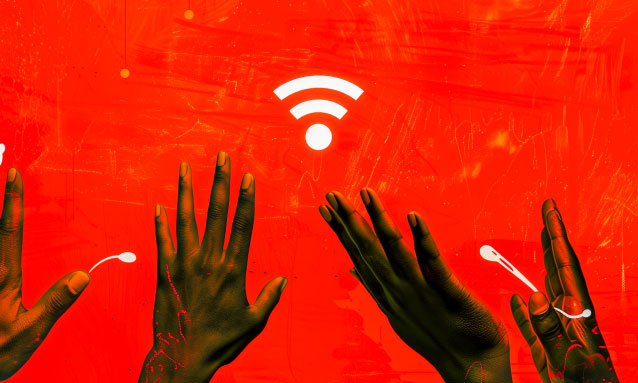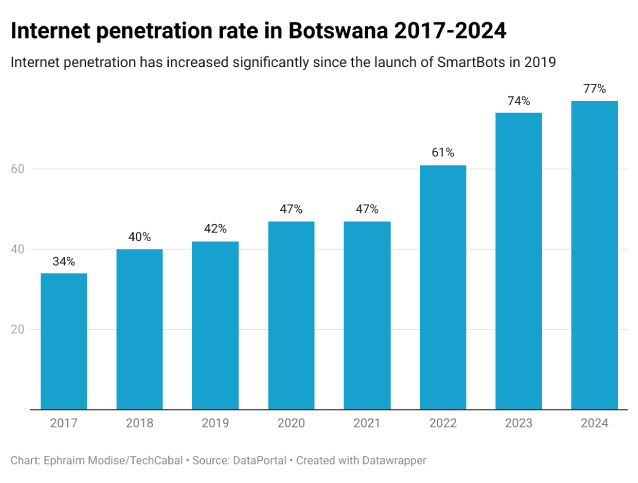
18 August 2024
In Botswana, internet subscriptions are expensive. 10GB of data can cost up to P1400 ($103) in a country where the minimum wage is P1500 ($111), cutting off a youthful population despite increased demand for internet connectivity.
In 2019, Botswana introduced SmartBots, free Wi-Fi routers in public spaces. Five years on, the project has scored significant wins, with over 1.6 million users. Internet penetration has also increased from 42% in 2019 to 77% in 2024, with the accessibility provided by SmartBots for low-income groups being a significant contributor.
SmartBots routers—placed in public facilities including clinics, schools, and dikgotla(traditional courtyards)—have speeds of up to 10Mbps. Over 1,100 public facilities have been fitted with SmartBots routers. On average, more than 130,000 users access the internet via SmartBots daily, and the government plans to connect more than 500 villages soon.
Botswana’s small and widely dispersed 2.4 million population makes providing telecommunications infrastructure expensive for telcos, which pass on the cost to consumers.

*Kago and *Tumelo, two 15-year-old Form 2 students, use SmartBots to access learning resources – that’s what they tell their parents. They spend most of their time watching football highlights on YouTube and scrolling TikTok. Nevertheless, before SmartBots, the youngsters would not have access to the World Wide Web as they do now.
“We are here every evening because the internet is free, there is no password, and it’s close to where we live, so we can leave late in the evening,” Tumelo tells TechCabal.
“Our biggest mission is to connect all the settlements in the country and then move to the concentrated but isolated farming areas,” said Pontsho Pusoitsile, permanent secretary at the ministry of communications, knowledge and technology.
The user base for SmartBots has grown over the years and is widely diverse, ranging from students to senior citizens. For the youth, the use cases for SmartBots include accessing social media, applying for job opportunities, downloading music series and even trading forex, which has gained popularity among Botswana’s young population amidst rising unemployment levels.
21-year-old *Daniel arrives at the Tshwaragano Clinic SmartBots hotspot at around 5:30 pm after he leaves work. He is there at least four days a week and can stay until night surfing the internet. He uses the internet for social media, updating his phone software and pursuing his side hustle, forex trading.
“The free internet is helpful because I’m learning forex and my friends say with enough wits, I can make easy money,” Daniel told TechCabal.
However, SmartBots is not without its problems. The service uses a household-grade router, so its speed depends on the number of people on the network. Most users target off-peak times, typically mornings and evenings when the most ardent users, students are either in school or at home.
55-year-old *Mooketsi usually arrives at the Monarch Kgotla SmartBots hotspot at around 7 pm when the student traffic starts to disperse. He uses the Wi-Fi at least 3 days a week to download revision material for his 11-year-old daughter who is preparing for her Primary School Leaving Examinations (PSLE).
“I want her to pass and eventually go to the University, so this revision material I downloaded will help her a lot,” he told TechCabal.
While SmartBots’ password-free Wi-Fi is a convenience, cybersecurity experts warn of the potential risks of using the open network. The lack of password protection raises concerns about user vulnerability to cyberattacks.
“If a malicious party accesses the router, they can easily hack users as the service does not use a password or any form of verification,” said Larona Olebile, a cybersecurity professional.
Officials at the Ministry of Communications, knowledge, and Technology did not immediately respond to questions about SmartBots’ cybersecurity concerns on SmartBots. However, users do not seem concerned about the security risks. Everything else is secondary as long as they can freely access the internet.
“Le rona re bata tshwana le bana ba malwapa a mangwe,” said one user. Loosely translated, it means “We too want to be connected like the rest of the world.”
Source: https://techcabal.com/2024/08/16/botswanas-wifi-smartbots-is-blowing-up-in-popularity/



